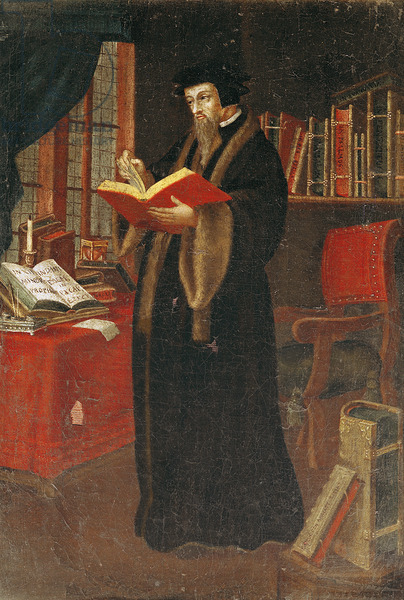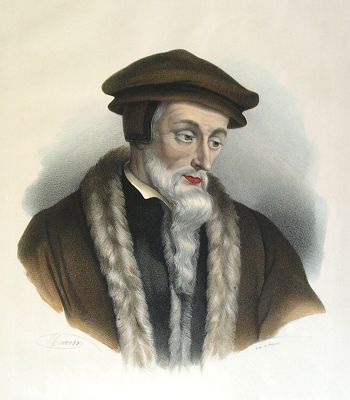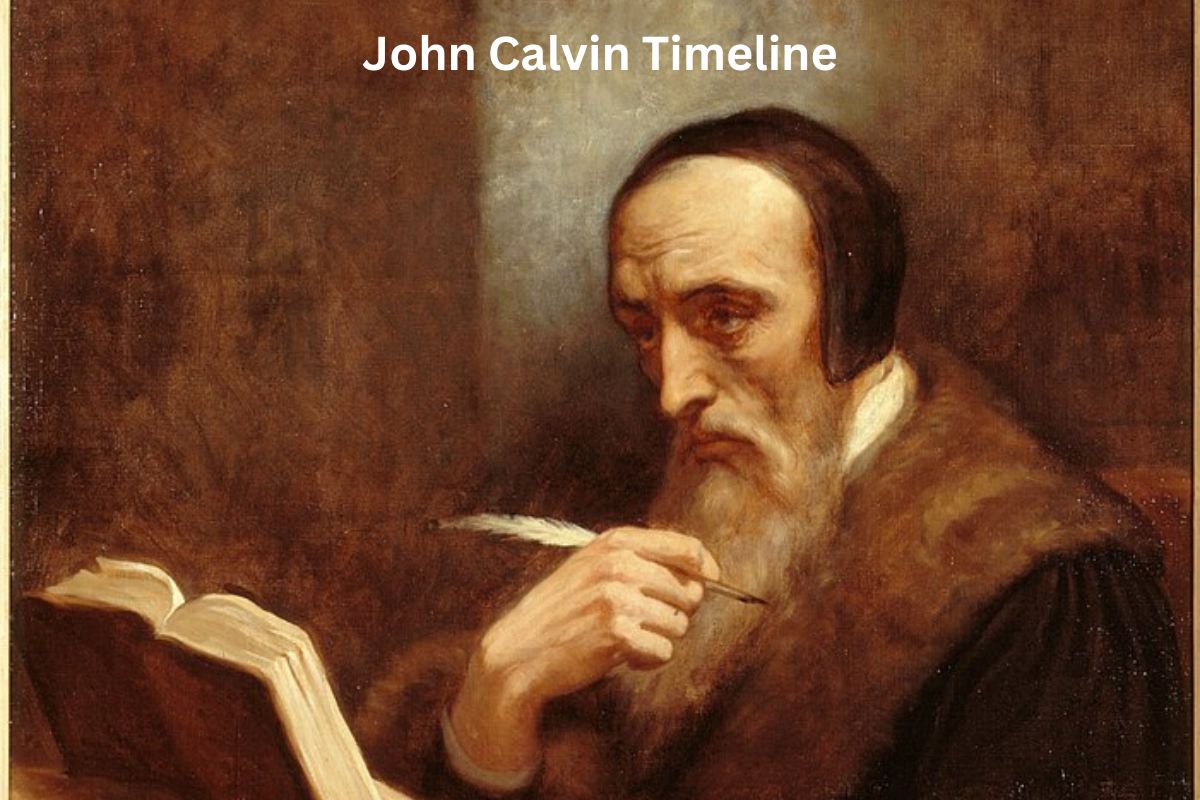John Calvin (1509-1564) was a French theologian and religious reformer who played a pivotal role in the Protestant Reformation. Born in Noyon, France, he initially studied theology and law in Paris.
After a religious conversion, he embraced Protestantism and fled to Basel, Switzerland, where he published his seminal work, “Institutes of the Christian Religion,” which became a cornerstone of Reformed theology.
Calvin’s ideas and leadership were instrumental in shaping the Reformed tradition, emphasizing doctrines such as predestination and the sovereignty of God.
He briefly served in Geneva, Switzerland, as a reformer, where he established a theocratic government and implemented a strict moral and religious code. Exiled from Geneva for a time, he continued his theological work in Strasbourg.
Calvin was eventually invited back to Geneva and continued his reform efforts, solidifying the city as a hub for Reformed Protestantism. He authored numerous commentaries on the Bible and theological treatises, leaving a lasting impact on Christian theology.
He passed away in Geneva in 1564, but his theological legacy, known as Calvinism, has profoundly influenced Protestantism and Christian thought worldwide.

| Year | Event |
|---|---|
| 1509 | John Calvin is born in Noyon, Picardy, France. |
| 1523 | Begins studies at the University of Paris. |
| 1528 | Experiences a religious conversion. |
| 1533 | Publishes “Psychopannychia” in defense of Reformation. |
| 1534 | Flees Paris due to Protestant beliefs and settles in Basel, Switzerland. |
| 1536 | Publishes “Institutes of the Christian Religion.” |
| 1536 | Visits Geneva and becomes involved in the Reformation movement there. |
| 1538 | Banished from Geneva. |
| 1541 | Invited back to Geneva and establishes a theocratic government. |
| 1549 | Publishes commentary on the Book of Psalms. |
| 1559 | Publishes final edition of “Institutes of the Christian Religion.” |
| 1564 | John Calvin dies in Geneva on May 27. |
Timeline of John Calvin
1509 – John Calvin is born in Noyon, Picardy, France
John Calvin was born on July 10, 1509, in Noyon, a town in northern France. At this time, France was a predominantly Catholic country, and Calvin was born into a Catholic family.
1523 – Begins studies at the University of Paris
At the age of 14, Calvin started his education at the University of Paris, one of the most prestigious academic institutions in Europe. He initially studied the liberal arts but later shifted his focus to theology.

1528 – Experiences a religious conversion
While at the University of Paris, Calvin underwent a profound religious conversion. This experience led him to embrace Reformation ideas and become sympathetic to Protestantism, which was challenging the Catholic Church’s doctrines and practices.
1533 – Publishes “Psychopannychia” in defense of the Reformation
In 1533, Calvin published his first major work, “Psychopannychia,” which was a defense of the Reformation. This work was critical of certain Catholic beliefs and practices, marking Calvin’s early involvement in theological debates of the time.
1534 – Flees Paris due to Protestant beliefs and settles in Basel, Switzerland
Due to his newfound Protestant beliefs and the growing tensions between reform-minded individuals and the Catholic Church in France, Calvin decided to leave Paris in 1534.
Also Read: John Calvin Accomplishments
He traveled to Basel, Switzerland, which was a center of Reformation thought and a safer environment for those sympathetic to Protestantism.
1536 – Publishes “Institutes of the Christian Religion”
One of the most significant milestones in Calvin’s life and theological career was the publication of his magnum opus, “Institutes of the Christian Religion.”
The first edition of this work was published in Latin in 1536. It was a comprehensive systematic theology that outlined Calvin’s theological beliefs, emphasizing the sovereignty of God, predestination, and the authority of Scripture.
Also Read: Martin Luther Facts
The “Institutes” became a foundational text of Reformed theology and went through several expanded editions throughout Calvin’s life.

1536 – Visits Geneva and becomes involved in the Reformation movement there
In the same year he published the first edition of the “Institutes,” Calvin made a brief stopover in Geneva while en route to Strasbourg.
During his stay, he was invited by Guillaume Farel, another Protestant reformer, to assist in the reform efforts in Geneva. Calvin reluctantly agreed and began working alongside Farel to advance the cause of the Reformation in the city.
1538 – Banished from Geneva
Calvin’s efforts in Geneva faced significant opposition, particularly from the city council. His strict moral and religious reforms were not well-received by some of the residents.
In 1538, Calvin and Farel were exiled from Geneva due to the tensions and conflicts surrounding their reform efforts. Calvin moved to Strasbourg, where he continued to write and teach.
1541 – Invited back to Geneva and establishes a theocratic government
In 1541, John Calvin was invited back to Geneva by the city council, which had undergone a change in leadership and was more receptive to Calvin’s vision for a reformed church and society.
Calvin returned to Geneva, and over the next few years, he played a central role in the city’s transformation. He established a theocratic government in which the church and state were closely intertwined, and he implemented a strict moral and religious code.
Under his leadership, Geneva became a center of Reformed Protestantism and a model for other Reformed communities.
1549 – Publishes commentary on the Book of Psalms
Calvin was not only a theologian but also a prolific writer and biblical commentator. In 1549, he published his commentary on the Book of Psalms.
This work was part of his larger project of producing commentaries on many books of the Bible, which became highly influential in shaping the understanding of Scripture within the Reformed tradition.
1559 – Publishes final edition of “Institutes of the Christian Religion”
Throughout his life, Calvin continued to revise and expand his “Institutes of the Christian Religion.” The final Latin edition was published in 1559, and it represented the culmination of his theological thought and contributions.
This comprehensive work served as a theological manual for Reformed theology and had a lasting impact on the development of Protestant theology.
1564 – John Calvin dies in Geneva on May 27
John Calvin passed away on May 27, 1564, in Geneva. His death marked the end of an era in the city’s history, as he had been a central figure in its religious and political life for many years.
Despite his death, Calvin’s theological legacy lived on, influencing not only the Reformed tradition but also broader developments within Protestantism and the shaping of Western Christian thought.
